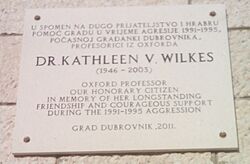Kathy Wilkes facts for kids
Quick facts for kids
Kathy Wilkes
|
|
|---|---|
| Born | 23 June 1946 |
| Died | 21 August 2003 (aged 57) |
| Education | MA Greats (Oxon); PhD in philosophy (Princeton) |
| Alma mater | St Hugh's College, Oxford, Princeton University |
| Occupation | Philosopher |
| Employer | St Hilda's College, Oxford |
| Known for | Jan Hus Educational Foundation |
| Parent(s) | John Vaughan Wilkes and Joan Alington |
| Relatives | Cyril Alington (grandfather) |
| Awards | Commemorative Medal of the President of the Czech Republic, October 1998 |
Kathleen Vaughan Wilkes (born June 23, 1946 – died August 21, 2003) was an English philosopher and university teacher. She played a very important part in helping to rebuild education systems. This was in countries that used to be under Communist rule after 1990.
Kathy Wilkes was known for her ideas about how the mind works. She wrote important books and many articles on this topic. As a dedicated teacher, she was well-liked by her students and fellow academics. Her most famous work involved secret activities behind the Iron Curtain. This was a name for the border that divided Europe into two areas. These activities led to the creation of secret universities and academic groups in Eastern Europe. For her brave work, President Václav Havel of the Czech Republic gave her a special medal in 1998.
Contents
Early Life and Studies
Kathy Wilkes was the daughter of Rev. John Vaughan Wilkes. Her father had been a teacher at Eton College and head of Radley College. Her grandparents on her father's side started a school. Her grandfather on her mother's side was a famous headmaster and writer of hymns.
Kathy went to Wycombe Abbey school. Then she studied at St Hugh's College, Oxford, where she earned top grades. She also studied at Princeton University in the United States. There, she earned her Ph.D. in philosophy.
After her studies, she became a fellow at St Hilda's College, Oxford, in 1973. She taught philosophy at the University of Oxford for the rest of her career.
Honoring Kathy Wilkes
In 2021, her old school, Wycombe Abbey, named an essay competition after Kathy Wilkes. Each year, students aged 13-14 (Year 9) can write essays. Topics range from philosophy to history. The best essays win a prize.
Helping Education in Eastern Europe
While at Oxford, Kathy Wilkes worked, often in secret, to help education in Eastern Europe. In 1979, she was the first Oxford philosopher to visit Prague. She was invited by a group of philosophers who were not allowed to teach openly.
She was very brave, holding secret meetings in crowded apartments. Even though secret police followed her, she was not afraid. She would lead them on long chases through cities. She made many risky trips, secretly bringing in banned books. She also took out writings that were not allowed to be published.
With friends from the West, she created the Jan Hus Foundation. This group became a major support for thinkers who were not allowed to speak freely. She helped and paid for many of these intellectuals. She even helped a Czech philosopher, Julius Tomin, and his family move to England. She drove them in an old car to the West. Back in England, she found them a home and paid for the children's schooling.
Supporting Education in Former Yugoslavia

In 1986, Kathy Wilkes became the head of a committee for the Inter-University Centre in Dubrovnik. She noticed that philosophers in Eastern Europe who liked a certain way of thinking were not heard. So, she started a journal called the Dubrovnik Papers. It is now known as International Studies in the Philosophy of Science.
She also paid for a young Croatian student to study at Oxford. She pretended the money came from a made-up trust. During the war in Croatia in 1991-1992, Dubrovnik was under attack. Kathy Wilkes refused to leave the city. She felt it was her duty to comfort people and tell the world about their suffering.
After the old governments in these countries fell, she worked to improve their universities. She spent time in Croatia. The University of Zagreb gave her an honorary doctorate for her efforts.
Kathy Wilkes was admired by her colleague Roger Scruton. He said her good qualities were often hidden because she was so humble. She also appeared in a TV show called College Girls in 2002. This show was about students at St Hilda's College.
Her Books
- Physicalism (1978)
- Real People (1988), Oxford University Press, ISBN: 0-19-824080-5
- Modelling the Mind (1990) (editor with W. Newton Smith)
 | Charles R. Drew |
 | Benjamin Banneker |
 | Jane C. Wright |
 | Roger Arliner Young |

